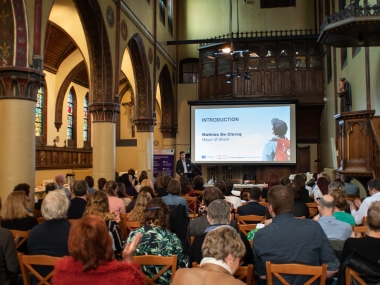‘STAY TUNED’ after the project concludes
Edited on
07 June 2019‘Early leaving from education and training’ (ELET) will be a challenge long after Stay Tuned concludes. With these words, Ghent vice-mayor of education Elke Decruynaere concluded the final conference of the European project on exchanging ideas and expertise between nine European cities. It indicates the necessity, not only to continue such exchange on tackling ELET long after our final conference, but also to find strategies to implement them in our respective cities.

Two and a half years of exchanging ideas and implementation strategies between nine European cities, supported by the European URBACT programme, ended on the 22nd of May in an inspiring final conference at the historical complex of Monastery PoortAckere in Ghent.
Ampelokipi-Menemini (GR), Aveiro (PT), Barcelona (ES), Berlin (DE), Ghent (BE), Gothenburg (SE), Nantes (FR), Sofia (BG) and Tallinn (EE), all brought forward their case examples and solution stories concerning ELET, ranging from intervening early in the dropout process, and professionalising school teams and proactive guidance of pupils on the verge of dropping out, to the creation of non-academic routes into training and the labour market.
During six sessions, representatives of the partner cities and their wider national networks discussed on the possible implementations, solutions in their own cities and schools. These were also moments to share the encountered challenges faced in the course of the project.
Agency Jugendberufsagentur (JBA) –combining the forces of education, labour and youth institutions to create new perspectives for dropouts– is very relevant not only to Berlin, but to all the cities in the network. An app detecting absenteeism –allowing schools to intervene early and proactively in the ‘dropping out process’– worked out for Gothenburg, and can do so for the other partners. In most cities, schools are looking for new ways to reach out to vulnerable groups. They are struggling to find and empower new approaches on education, that fit the needs of the students –not vice versa. That’s why the vice-mayor called on Europe and the different national and regional governments to enable them to actually realise these diverse solutions, not only in the cities where they were conceived, but in all cities of the network and beyond.
Stay Tuned was more than a cross-border ‘channel’ for inspirational ideas; it also allowed to build a transnational network on municipal level, which remains relevant to dealing with ELET. That’s why Ghent, the lead partner of Stay Tuned, states the need for ways and means on a European level to keep exchanging between cities, on each other’s strategies as well as on each other’s trajectory actually implementing (some of the) solution stories. Ghent, like all other cities within the Stay Tuned network, will remain pivotal in European partnerships to do just that. “Because,” the vice mayor concluded, “more than ever, we need to combine ideas and forces to face and create a European future, that is urban. Let’s keep thinking and acting cross-border. Let’s ‘stay tuned’ among ourselves – as cities – who want to keep everyone ‘tuned in’. Especially those, who lack perspective and opportunity.”
As Mathias De Clercq, the Mayor of Ghent, mentioned in his opening speech: “I hope that the solution stories of Stay Tuned become YOUR solutions.” It’s an impetus to keep on sharing expertise in the upcoming months and years, to look for ways to further implement examples that work. In the end it’s not only about tackling ELET, but also about creating opportunities for young people.
Submitted by Matthias Peynshaert on
